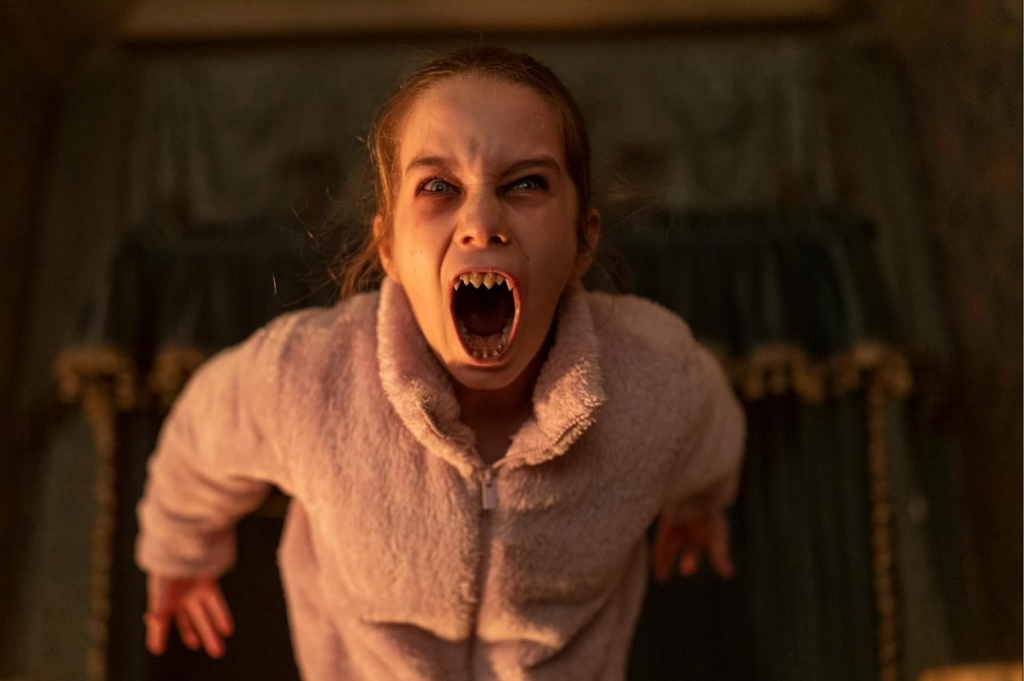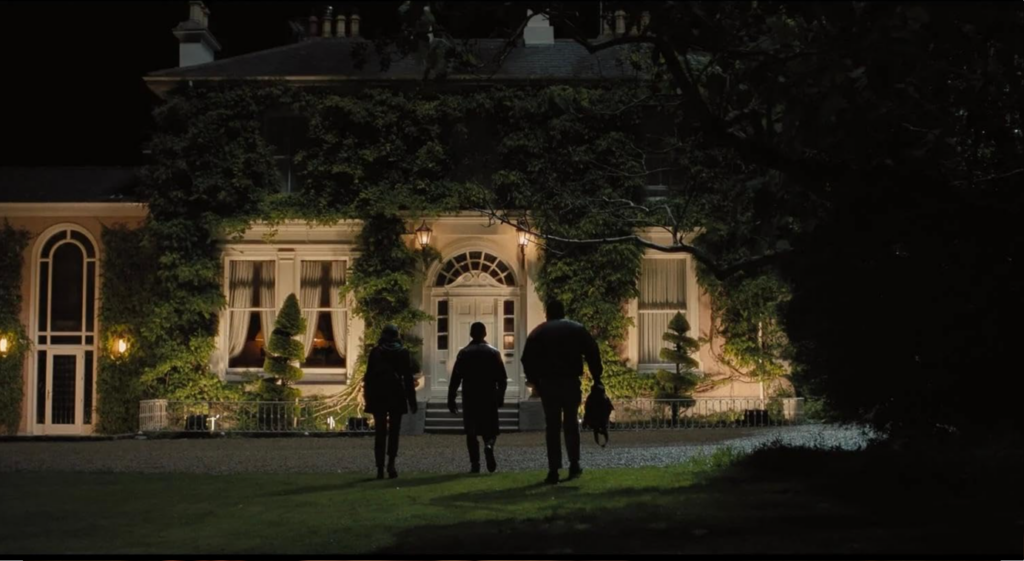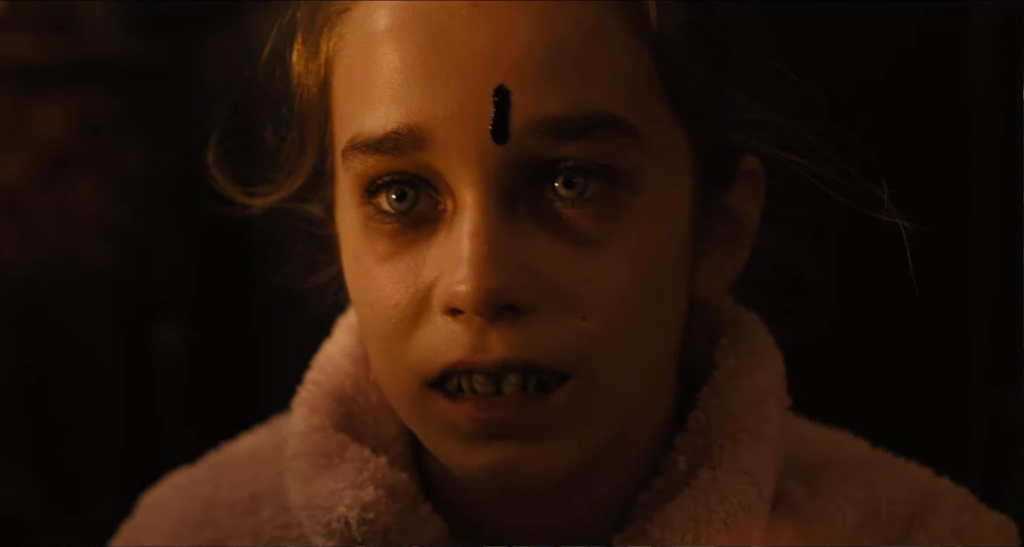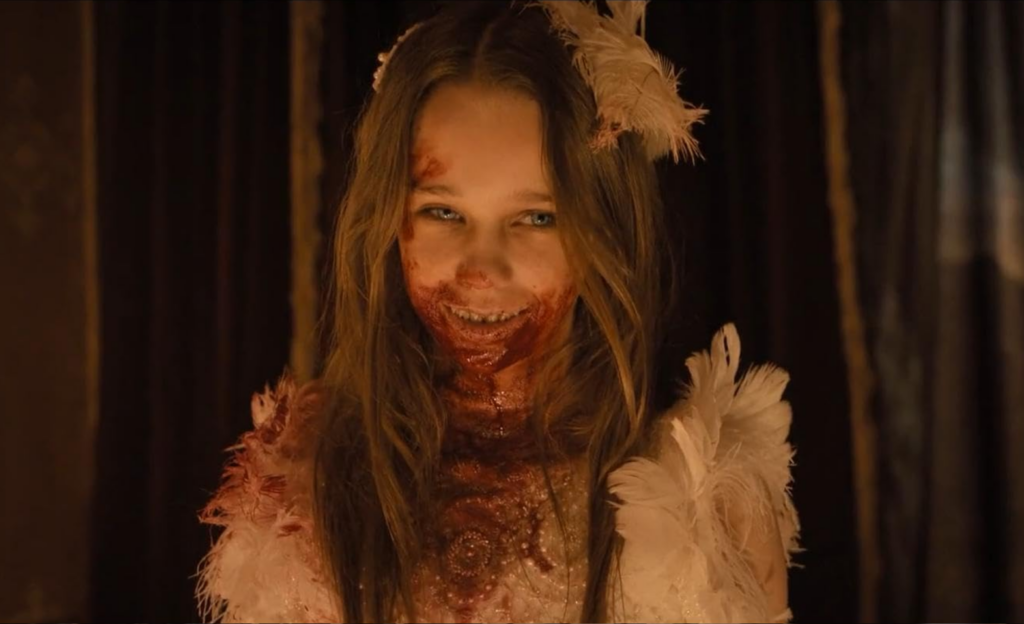When a movie like Abigail taps into the legacy of Dracula’s Daughter (1936), it carries the weight of high expectations, especially among genre enthusiasts who appreciate the nuances of classic horror. Abigail (2024), directed by the talented Matt Bettinelli-Olpin and Tyler Gillett of Radio Silence fame (Ready or Not, Scream), rises to the challenge while firmly staking its claim in the vampire sub-genre. It’s not just a movie—it’s an experience, a glorious blend of gothic atmosphere, visceral thrills, and compelling performances, spearheaded by a phenomenal turn from Alisha Weir as Abigail.
A Dance of Mystery and Terror
From the moment the film opens, the stage is set for a tale that’s equal parts menacing and elegant. Abigail, a ballerina with a dark secret, is kidnapped by a group of ragtag criminals looking to exploit her father’s wealth. Little do they know, their prey hides a far more sinister nature—they’ve locked themselves in a house with an actual vampire. The trailer offers glimpses, but the film unfolds like an unpredictable waltz, keeping viewers enthralled as it dances between suspense, humor, and shocking bursts of horror.
Adapted from the classic Dracula’s Daughter, the film avoids predictability while paying homage to its origins. Like the titular character of the 1936 film, Abigail is a layered and intriguing vampire who flips the narrative on its head. Themes of power, revenge, and haunting elegance play in every scene she dominates. Alisha Weir, perhaps best remembered as the titular Matilda in Matilda the Musical (2022), utterly reinvents herself in this role. Her portrayal of Abigail combines sinister charm with otherworldly ferocity, making her a standout in the film and, dare we say, a vampire for the ages.
Alisha Weir as Abigail—A Star Transformed
One of the shining highlights of Abigail lies in its casting, and no one shines brighter than Alisha Weir. The transformation from her role as a sweet, empowering Matilda to a balletic vampire dripping with malice and mystery is nothing short of spectacular. Weir brings a chilling physicality to Abigail, using her dance background to move with an eerie grace. Whether stalking her captors or delivering haunting dialogue like a seasoned genre icon, she commands every frame.

Her take on Abigail’s vampiric form is equally striking. The makeup team has done a phenomenal job crafting a look that is both classically gothic and refreshingly modern. The sallow complexion, piercing eyes, and perfectly menacing fangs are everything you could want in a vampire film. When Abigail lets loose, gliding through the mansion like a dancer with murderous intent, it’s impossible to look away.
The Vision of Radio Silence
Directors Bettinelli-Olpin and Gillett bring their signature style to Abigail. Known for blending sharp wit with a profound respect for genre conventions, they’ve crafted a film that is as thrilling as it is self-aware. True to their form, the action is suspenseful, the scares are effective, and the blood flows liberally without slipping into gratuitousness.
The mansion, the primary setting, feels like a character itself, full of winding hallways, gothic furniture, and dark corners that hide both literal and figurative dangers. It evokes classics like Clue and Crimson Peak while maintaining a personality of its own. The choice of setting amplifies the tension as Abigail’s captors, one by one, realize they’re far from in control.
A Cast That Elevates the Script

The supporting cast matches Weir’s energy, delivering engaging performances even as the focus remains squarely on Abigail. Melissa Barrera leads the screen as Joey, an intense and layered anti-hero who serves as the de facto leader of the ragtag group. Dan Stevens, as the slightly unhinged mastermind of the plan, brings his signature charisma, while Kathryn Newton’s bratty electronics hacker Sammy serves as sharp comedic relief. In one of his final performances, the late Angus Cloud makes an endearing mark as the group’s driver, Dean.
The film smartly uses its ensemble to build tension and deliver the kind of witty character interplay audiences expect from a Radio Silence project. Every actor feels like they were handpicked to play their role, which elevates a screenplay that would feel more familiar in less capable hands.
A Vampire Film That Balances Fun and Fright
What sets Abigail apart is its ability to have fun with the vampire sub-genre while still respecting its roots. Moments like Abigail waltzing through the carnage to the haunting strains of Swan Lake bring a macabre elegance to the proceedings. The film’s humor is subtle but effective, offering a reprieve from the intensity without undercutting the narrative.

The gore is plentiful but never cheap. From the first shocking reveal of Abigail’s true nature to the film’s bloody conclusion, every set piece is handled with visual flair and meticulous direction. The pacing falters slightly in the third act, threatening to overstay its welcome, but the closing moments deliver enough payoff to justify the extra runtime.
A New Vampire Classic?
Abigail doesn’t reinvent the wheel, but it gives it a much-needed spin. It’s a film that understands the allure of the vampire mythos, combining gothic romance with brutal survival horror in ways that feel fresh and exciting. For fans of genre cinema, it’s a blood-soaked treat that promises a thrilling night at the movies. For mainstream audiences, it’s a reminder of why we continue to be fascinated by vampires after all these years.
And for Alisha Weir fans? It’s an announcement that a new horror icon has officially arrived.
If you haven’t yet experienced Abigail, you’re missing out on one of 2024’s most entertaining genre films. Weir, Bettinelli-Olpin, and Gillett have crafted more than a movie—they’ve created an event. Long may Abigail rule the night.


